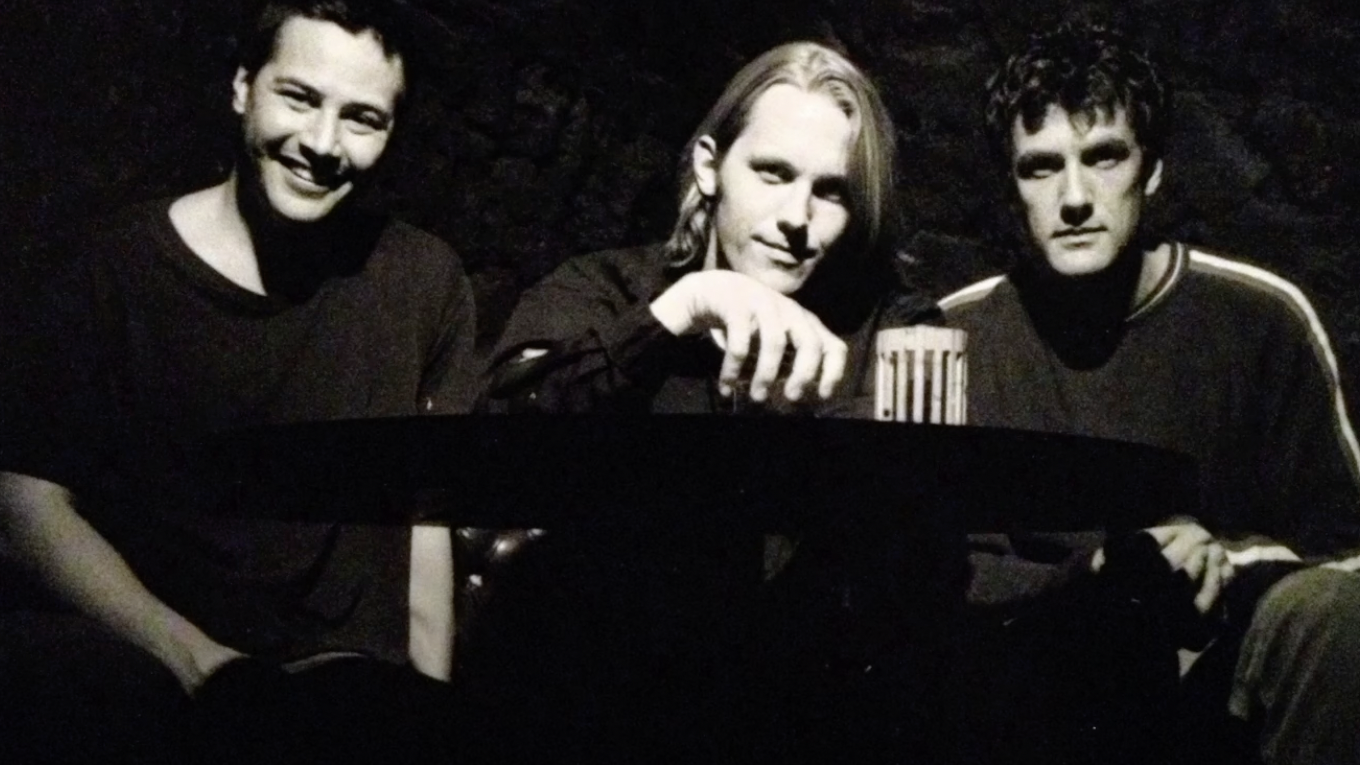Dogstar, a band beyond Keanu
Andraž Tavčar
JOURNALIST AT THE ADRIATIC
Learning that the lead actor from films like Point Break and The Matrix also slaps bass in a band called Dogstar came as a surprise for me. The sort that at least merrited a bemused exhale through the nose and a quick Google search as I paused my search for upcoming events to include in our newsletter. What was meant to be a brief overture became a week spent marinating in the band’s discography – the soundtrack to my daily grind and nightly unwinding – as I immersed myself in the vibe.
Before long, I began to elucidate my friends as to what I referred to as ‘Keanu Reeves’ band’. “Do you like Keanu Reeves?” I’d ask. “Most recognise him for his roles on the big screen, but there’s this whole other facet to him – a grunge layer revealed through his band, reminiscent of the post-Nirvana scene and offshoots like Foo Fighters. At first, their music struck me as slightly out of time, as if a band from the ’70s somehow got stranded in the ’90s Seattle music era. It’s fascinating really. The ’70s heralded a zenith in rock history, marked by its raw, undiluted energy, something the ’90s seemed to chase after, albeit warped by cynicism and irony.”
Inexplicably, they veer into the bathroom stall, leaving me humming “I want to live in America” alone by the urinals, a personal favourite. I’d lose myself in visions of smoke-filled, dimly lit dens, populated with disheveled youths in flannel and ripped denim, nursing soon-to-be ripped bongs in their laps while Led Zeppelin plays and General Schwarzkopf lauds U.S. air superiority in Iraq on a flickering TV screen. “I want to be alone and free,” the lyrics echo, bouncing off the restroom’s tiled walls with an acoustic quality found only in the grimiest of Ljubljana’s diver bars. In other words, perfect.
There’s something to be said about the rise of grunge at the Cold War’s denoument. Its deep cynicism and rejection of consumerism cut charply through Fukuyama’s professed “end of history” and Mearsheimer’s “unipolar moment”. Concepts, once heavy with meaning, now cheapened by their overuse and evoked only for the sake of depth and academic rigour – remember, I was still humming in the bathroom at that point. Free markets and democracy were hailed triumphant, even as the American dream was marred by the detritus of heroin, poverty and racial strife. Grunge didn’t offer remedies; it mirrored a generation too deep in the fog to even care. “I want to be alone and free,” was a lament for the times.
Art, in its myriad forms, is a chameleon of expression – it harbors the ability to morph and reveal itself in layers. Whether it’s a well-loved novel or a song that sticks, engaging with it is as much an exploration into our own consciousness as it is into the mind of the artist. Fortunately, both extend beyond the scope of this article, but I think I can venture to at least surmise the latter and answer the more obvious question, dear reader, that’s been stuck in your head since you saw the title: Why is Keanu Reeves in a band named Dogstar and are they any good?
It’s not uncommon for movie stars to take on passion projects and veer into music, though they often amount to little more than vanity projects, with sheepish audiences of fans bobbing their heads politely to songs lacking heart. Bruce Willis’ brief stint as a jazz musician after playing a blues singer, comes to mind. Yet Keanu, with stark honesty, acknowledged his place in Dogstar, and the modesty with which he views their craft. “We’re terrible.”
Before they were known as Dogstar, the band’s story began with a chance encounter in a Gelson’s supermarket in 1991. There, Toronto-born Keanu, spotting a man in a Detroit Red Wings jersey – Robert Mailhouse, known for his role in the soap Days of Our Lives as police officer Brian Scofield – struck up a conversation about hockey, and the two soon found their shared passion for music. Keanu on bass, Robert on drums, the pair added a third – singer and guitarist Greg Miller.
Poring over videos of the band’s early performances and a cursory glance at their Wikipedia page, Keanu doesn’t at any point parade as actor/musician. He doesn’t seem to have the restless urge of most creatives, that drives them to do it all or die by the time they’re 27. Moreover, on stage, he’s off to the side, head down, foot tapping and keeping time. He’s Keanu Reeves, but on there, just another bass player.
Finding something that teeters on the edge of the genuine can be a daunting task in California, especially among actors. Starting a band off a chance encounter with a guy, just because you’re both into hockey, is as real as it gets. The band crystallizes the addagge of the now-defunct TikTok precursor, Vine, of “guys being dudes” – for example, men becoming blood brothers with the first person they sat next to during induction week of university. Being part of Dogstar offers Keanu a respite, a chance to unwind and indulge in what he loves, surrounded by a tight-knit circle of friends, far from the glare of entertainment journalists’ sycophantic, artificial grins.
Despite his widespread appeal and a certain fondness from the press – earning him accolades as “the nicest human being” – fame brings with it its own set of pressures, setting a bar of expectations that accompanies his every move.
Ironically, Dogstar’s fame hinges on Keanu, despite their obscure beginnings. They waver between names like Small Faecal Matter and BSF – shorthand for either Big Fucking Sound or Bull Fucking Shit. “I had long ceased to be interested in her contortions; except for the part of me that was in her I was as cool as a cucumber and remote as the Dog Star,” reads the line from Henry Miller’s book Sexus that inspired the more palatable name for their live performances.
Shows soon sell out and lead singer Miller departs, replaced by Bret Domrose. Dogstar tours the U.S. and Asia, opening for legends like David Bowie and Bon Jovi in ’95 in Australia and New Zealand. They debut with the EP Quattro Formaggi, then release Our Little Visionary, available only in Japan.
Balancing Keanu’s acting career, Dogstar released Happy Ending in 1999. Their final show was in 2002 in Japan, leading to an unofficial hiatus. Despite not formally pausing or producing new music for two decades, they occasionally played small venues.
The band made a comeback alongside the release of Matrix Resurrections in 2021, and, like all good things, it started with breakfast. “There was a premiere for Matrix 4 in San Francisco, and the next morning we had breakfast,” said Keanu in an interview for Entertainment Weekly. “That was the initial spark.” Dogstar returned to a major stage at the BottleRock Napa Valley Festival in May of last year. Their latest album, Somewhere Between the Power Lines and Palm Trees, was released in October, with performances at INMusic Festival in Zagreb and Arsenal fest in Kragujevac planned for June of this year.
To answer the question of whether they’re easy on the ears, it’s best to ignore Keanu’s remarks. Artists are often their own harshest critics, and Dogstar’s history of headlining shows alongside icons like Bowie and Bon Jovi suggests they’re far from lacking in talent. Indeed, Keanu’s celebrity alone wouldn’t have sufficed to cover for any musical shortcomings. Moreover, my willingness to listen to their music for a week straight implies I’m not engaging in self-torture — I’d like to think I’m still too young for that.
Dogstar demonstrated a versatile range. They can shift from anthem-like rock songs filled with emotive guitar solos to quieter, narrative-driven tracks. This duality in their music allows them to navigate seamlessly from lively indie surf rock, characterized by jangling guitars, to more elaborate pieces tinged with the depth of progressive rock and grunge.








